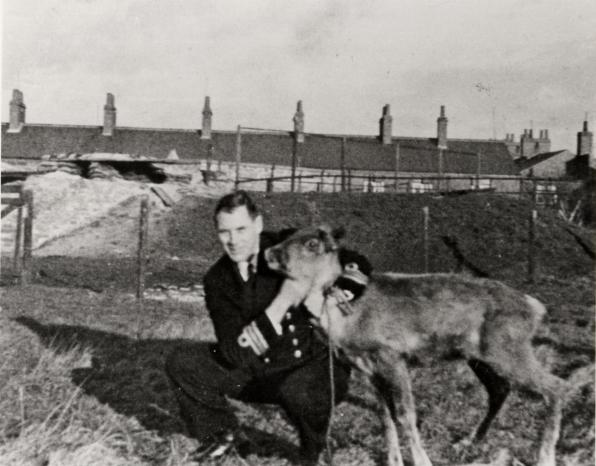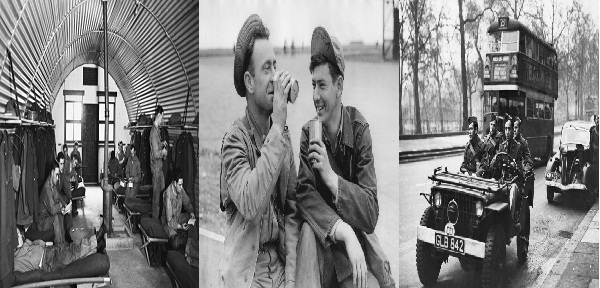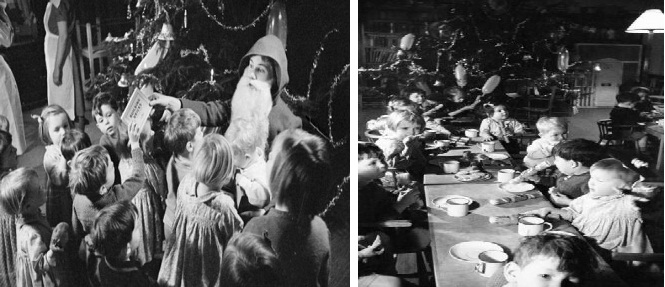Α)Christmas with GIs: How American Soldiers Took The Place of British Fighting Men During WWII

American
GIs sent to Britain during the height of WWII were repeatedly described
as “overpaid, oversexed and over here” but at least, on Christmas they
made many a British families happy with their presence during the
holiday celebrations. The main reason – they brought with them extra
rations as well as the much sought after Coca-Cola and nylon stockings.
With
British soldiers away battling on the Western Front, their families
left in Britain were encouraged to invite the US soldiers stationed in
their country over to celebrate Christmas. This they readily did because
they knew the soldiers would be bringing extra food with them. As for
the American GIs in the foreign land, it was their way of escaping the
difficulties brought about by being away from home on an occasion that
would have been best spent with families and friends.
About 60,000
GIs (or Government Issue) were sent to Britain come December most of
whom were stationed in East Anglia where they build airfields for
American planes.
Most
of these American soldiers were given the day off come Christmas and
were told to spend their holidays with British families as “fillers for
the chairs left empty by British fighting men”.
Posters bearing the words, “GIs spend your Christmas at home with a British family”, were also put up around the bases.
For
their part, the British families keen on having the WWII GIs in their
homes for Christmas issued invites; every single GI was offered as much
as 50 invitations. Those who accepted the offers brought special rations
packs given them to share with the families they were going to. These
packs included items that were sought-after in those trying times –
fruit juice, evaporated milk, bacon, coffee sugar, rice, peas and lard.
The
many invites each GI received was mainly because WWII and food
rationing brought a drastic change to how Britons celebrated Christmas.
The usual festivities had to be scaled down or done without because of
the food restrictions and shortages caused by war; even the most
basic foods were scanty.
Gifts had to be homemade, children’s toys had to be fashioned using recycled materials.
The extra food the GIs brought with them would have been heaven to these war-affected families.
“The
ration is estimated at 50 invitations for every one soldier available,”
said a US camp commander during the Christmas of 1942.
He even urged more GIs who were to spend their first Christmas within Britain “to accept some more of those invitations”.
As one GI recounted in the book “Overpaid, Oversexed, And Over Here: The American GI In World War II Britain” written
by historian Juliet Gardiner, he went to one British woman’s home for
Christmas riding a bicycle loaded with his Christmas rations of spam,
powdered coffee, chocolate and soap along with other items he had taken
from his camp stores.
“We all sat down
to a Christmas dinner and scene that might have made Charles Dickens
the only true recorder,” he said then added…
“I don’t recall what we had for dinner, but at long last the plum pudding was served – and I gained the silver sixpence.”
What Wartime Christmases were Like
The
GIs did just brought along their rations when they went to spend
Christmas with British families; they introduced American Christmas
traditions as well as the Christmas crackers.
The British, on the other hand, acquainted their guests with their Advent calendars and candles.
One
remarkable feature that peacetime Christmas and wartime Christmas had
in common was the singing of songs and carols. 1939 saw the start of
BBC’s special Christmas Day radio program that included a speech from
the king, an affair that has become a yearly Christmas occurrence until
this day.
The
Americans were also known for throwing extravagant Christmas parties
during Christmas times at their Army and air bases as a way of helping
British families forget their wartime difficulties. They mostly invite
school children from the locality to join in the festivities.
At
one time, war orphans were invited to a party prepared by the US Army
soldiers of the 3120th Signal Service Battalion which was held at the
Salvation Army War Emergency Home in Lady Templemore’s estate,
Alresford, Gloucestershire.
These children were targeted and made
the guest of honors in the said celebration as Christmas was most trying
for them – they were not only away from home, they also had to deal
with the loss of a loved one whether in action or through the bombings
raids done by the enemy that frequently happened throughout WWII.
A
guest of another party thrown by the GIs for school children in the
Town Hall of Middlesbrough recalled how the youngster each received a
gift from an American-accented Santa.
“The
G.I.s had decorated the interior with lots of flags, Stars and Stripes
and Union Jacks, together with tinsel and paper chains.
They
served an immense amount of food, not only the cakes, jellies, and
blancmange but many sweet dishes that we hadn’t seen for ages due to
rationing,” he recounted.
The GIs even showed enthusiasm in
decorating their bases for the holidays by hanging “chaff”, the strips
of metallic foil they would often throw from their planes to mislead
German radars; to trees to the other more traditional holiday decors
like lights and streamers.
GIs and Britain

When
GIs first arrived on British shores in 1942, they had brought with them
Coca-Cola nylons, chewing gums and cigarettes which were considered
luxury items by their British counterparts.
At first, the Brits distrusted their American counterparts.
They
were paid five times more than the British soldiers that was why they
could afford to be very generous and this trait had rendered them
attractive to many British women.
About 70,000 British women
became GI brides; it was even estimated that over 9,000 babies were born
illegitimately because of GIs love affairs.
At the end of the
Second World War, free passage were offered to British GI wives by the
US Army so that they could get to their new homeland and start anew with
their husbands. Nevertheless, their journey to their new homes was not
without difficulties.At one time, their trip was cancelled because of
bad weather and they had to wait for a ne opportunity to make it to
America.
By the time WWII ended, about three million GIs were assigned in Britain and had carried on the moniker “overpaid, oversexed and over here”.
www.warhistoryonline.com
===================================
A fully grown Reindeer lived on a British submarine, ate a navigation chart and got so fat that it couldn’t get back out.
SHARES
| FacebookTwitter |

As the 70th anniversary of World War Two is remembered around the world, a story of Christmas cheer has been revealed by the Royal Navy Submarine Museum in Gosport, UK.
Conditions aboard submarines in the 1940s left little to be desired; cramped, dark, and with long stints at sea. The crew would have been understandably despondent when Christmas came around. However in 1941, the Soviet Navy gave them a little Christmas cheer in the form of a real-life reindeer.
The British Navy’s HMS Trident had 56 crew members and was fighting the German Navy in Arctic waters in the winter of 1941. The Russians and British were allied together, fighting against Nazi Germany.
A few days later, the captain and crew of HMS Trident were astonished to discover the Russians returned with a fully-grown reindeer as a gift. She was named Pollyanna, and was lowered into the submarine through one of its torpedo ducts. While it was a very unusual situation, the British graciously received the gift and set off to sea with her for six weeks.
Pollyanna slept under the captain’s bed and lived on some moss the Russians had provided as well as scraps from the kitchens. She took to eating condensed milk and would run to the air hatch whenever the submarine surfaced to get a breath of fresh air. She remained healthy and gave the crew much to smile about, even in their cramped conditions.
When the submarine returned to the UK after its mission, Pollyanna had eaten and lived so well on board that she had to be winched and squeezed out of the vessel. The London Zoo became Pollyanna’s home until she died five years later, only a week after HMS Trident was taken out of active service in 1947.
The Royal Navy Submarine Museum has a submarine similar to the HMS Trident on display which can be visited year round. One Christmas, the museum hosted a Santa inside the submarine, and while they did not include a live reindeer they left some moss in the torpedo duct in Pollyanna’s memory.
www.warhistoryonline.com
==================================================
Γ)Battle of the Bulge – Christmas in the Eyes of a WWII Veteran

“Christmas never comes around that I don’t think of the Battle of the Bulge.”
Sergeant Malcolm “Buck” Marsh Jr. spent Christmas this year surrounded by his family – three children, seven grandchildren, and five great-grandchildren – as they cuddled together around a carefully decorated Christmas tree.
However, no Christmas ever passes without reminding the WWII veteran about the Christmas he spent in knee-deep Belgian snow readying for battle along with his comrades from the Company A of the 36th Armored Infantry Regiment during the Battle of the Bulge.
“Some of the guys were able to have Christmas dinners, and we had the supplies, but we couldn’t to them. We were in what we called ‘Buzzbomb Alley.’ … They didn’t have a kitchen set up, so they gave us C-rations,” he recounted.
The men proceeded to light fires in 55-gallon drums to heat up their Christmas dinners that consisted of ham sprinkled with bouillion powder and egg; the band’s chaplain had already blessed their rations during the midday Christmas service.
The 21-year-old soldier who was 5,000 miles from the warmth of his home decorated for Christmas along with his fellow servicemen.
“We took (the ration cans) and hung them on the evergreen trees. Some of the guys had gotten some cardboard and cut out some stars and things. It got dark at about four in the afternoon. Some of us that could sing were singing Christmas carols,” he added.
The next day, however, was another matter when they were sent on their way to join Company A of the 36th Armored Infantry Regiment and on December 29, 1944, he officially entered the “bloodiest U.S. battle of World War II”.
Marsh pointed out that the Battle of the Bulge was the biggest land battle American troops ever fought in – it lasted from December 16, 1944, to January 25, 1945 – and he then added that the casualties resulting from it was heavy.
The company was divided into pairs and Bob Janicki became his foxhole partner. They, like every other pair, shared a foxhole that was six-foot long, four-foot wide and twelve inches deep.
He further recounted that when he joined, it had just begun to snow. Temperature readings floated over between zero and five degrees, and their predicament was made worse by their foxhole lifestyle.
So, to stave off the brutal cold, both he and Janicki layered their foxhole alternately with raincoats and blankets, if there were any, topped with overcoats before lying in.
“Bob had suffered a terrible facial wound earlier in the war. One side of his face was burned. I always said Bob wasn’t pretty, but he sure was warm,” Marsh mused about his foxhole buddy.
Even at 90, the WWII veteran’s memories about the war remains sharp, and one of the things he never forgot about it was the cold.
“In the Bulge, water froze in our canteens. I think the weather was equally as bad as being shot at.”
He even experienced being in the “snow patrol” and American soldiers, being without snow camouflage gear like the Germans, had to do with whatever that were on hand – white bed sheets. They sewed hoods and arm pieces on these to hide their green uniforms in the snow.
“I looked like a bride with a four-foot train coming down the aisle,” he laughingly added about his original snow gear then.
Marsh was also assigned a reconnaissance mission along with three other soldiers which meant they had to sneak behind the German lines by way of a sunken road. As they trudged through the snow that was about thigh-deep, they heard icicles falling over their heads and ducked for cover.
“The four of us just melted into the snow with our funny snow capes on. The Germans were about six feet from us,” Marsh recalled about their escape.
When January 20 dawned, Marsh’s division was able to meet up with the 2nd Armed Division at Houffalize, a Belgian municipality, and sealed off the said war. Five days later, it was officially over.
But the war did not end for Marsh after the Bulge. Marsh, together with his company, had to cross The Rhine, aid in the capture of Cologne as well as free a prison camp in Nordhausen, Germany.
For his heroic efforts during the war, Marsh was given the Purple Heart along with other military decorations and medals. He stayed in Europe as part of the army of occupation and returned home February 1945.
Marsh was named honorary command sergeant major of the 36th Army Infantry Regiment in 1999. He, together with his wife Wanda, traveled all the way to Germany to receive the award and visit some of the battle sites he fought in Belgium.
After leaving the Army, Marsh had been very vocal about his years as a soldier especially about his time spent in the war. He was one of the veterans featured in the documentary Alabama Remembers WWII put up by the Alabama Public Television. In 2011, he wrote his memoir Reflections of a World War II Infantryman.
But behind his stories of victory, camaraderie, and bravery, he also experienced agonizing loss.
“When the war ended, I was the only one left,” he said. “…We had 88 killed in action.”
He then recounted how a sniper killed a squad member on each of his side at Dom Theatre in Cologne – Robert Morries and Richard Baughn.
Marsh said that talking about his war experience to his Auburn University Phi Delta Theta brothers as well as to his biological ones helped him cope up with the harrowing experiences he had during the war.
“I was very fortunate to get through all of this. I think talking about the war with my brothers and (friend) Gene Sledge so much, it kept me from internalizing,” he added.
“I really don’t think it’s healthy to keep it all inside of you. It did me good to talk about it.”
Every year spent with his family wrapping gifts with his wife and waiting for everyone to come for the holidays; Marsh always remembers how Christmas Day was in Belgium some seven decades ago.



Δεν υπάρχουν σχόλια:
Δημοσίευση σχολίου